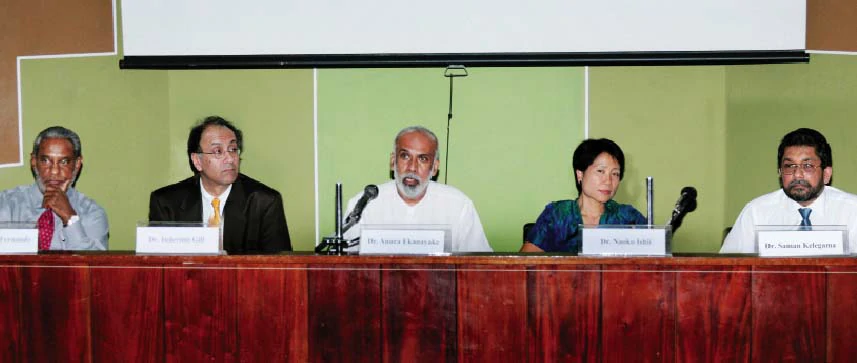
Although Eastern Europe’s high FDI is not unusual what is to be noted is there has been more dependency on external borrowing compared with other emerging economies.
With the main objective of spreading awareness on the current global economic crisis and its effects on the emerging markets, the World Bank Organisation and the Ceylon Chamber of Commerce presented a public lecture by Dr Indermit Gill, Chief Economist, Europe and Central Asia Region of the World Bank.
Chaired by Dr Anura Eakanayake, Vice Chairman, Ceylon Chamber of Commerce, the panel of speakers also comprised of Dr Saman Kelegama, Executive Director, Institute of Policy Studies of Sri Lanka, Ranjit Fernando, Chairman of United Motors Lanka, Director of ICICI Internationl and Naoko Ishii, Country Director, World Bank – Sri Lanka.
Dr Indermit Gill focused mainly on the effects of the Global Economic Crisis on the emerging markets of Eastern and Central European countries. With a comprehensive presentation titled “Emerging Markets: expect a slow recovery”, his message covered the current status of the crisis, its effects and importantly what problems should be addressed in alleviating them.
Dr Gill began by stating that global conditions are worsening and the growth forecasts that are being made are too rosy. Although recovery is forecast as early as 2010, forecasts made in 2007 and 2008 in yearly GDP percentage change for 2009, are higher than the actual GDP growth. In 2009, global trade is forecast to fall for the first time in 27 years. The GDP losses with credit crunch and house-bust price recessions cumulatively could be more than 10%. Comparing the past incidents of economic crises, Dr Gill pointed out the global nature of the present crisis and that the housing crisis, equity price busts and the universal credit crunch make this crisis an unprecedented one.
Emerging Europe entered the crisis weakest-fiscally, financially, and socially. The countries often had major fiscal imbalances such as high debt to GDP ratios, combined with low foreign exchange reserves, and rigid exchange rate regimes; poorly regulated banks and dependency on foreign savings; and inadequate safety nets with low coverage and lots of leaks.
What was apparent from the current global economic crisis is, the discrimination of the markets with rising credit defaults spreads in Europe and Central Asia, where Europe is hardest hit compared to other emerging markets. It is the worst hit countries or first hit countries that enter the crisis weakest. High debt ratios imply solvency problems, while high ratios of short-term debt to reserves mean liquidity problems. Most economies in east and central Europe face one or both of these problems, though the extent can differ significantly between countries of the region.
Central and Eastern European banks often have high loan to deposit ratios and their local assets are often owned by foreign banks through which they become exposed to toxic assets through the parent banks. Other banking culprits include rapid credit growth, high foreign exchange risks in mortgage loan portfolio, poor risk management systems and incentives and lax and under-resourced supervision.
Weak social safety nets are due to emerging market economies spending considerably more on social insurance rather than on social assistance, which may be most necessary to protect the poverty related gains that the region has made during the last decade.
Emerging markets are exposed to the crisis through 3 channels that link to the global market: capital markets, product markets and labour markets where declines can be expected in external financing, trade and remittances respectively. Although Eastern Europe’s high FDI is not unusual, what is to be noted is, there has been more dependency on external borrowing compared with other emerging economies. A dramatic slow down in product markets in Western Europe would reduce demand for exports, particularly those that trade heavily with EU15. In labour markets of low income countries will be affected by lower remittances while growth migrants would also fall sharply though with slow recovery.
Dr Gill stressed the importance of focusing attention on addressing these problem areas susceptible to the economic crisis, rather than on the ever changing growth forecasts. Recovery from a crisis such as this would require discipline where slower recovery requiring structural reforms and social programmes. Speedier reforms can be made to capital markets through improved regulation and supervision of banks. Slowdown in product markets signals the need to improve investment efficiency by creating a better business climate. The decline for regional labour demand indicates the need to maintain investments in basic health and education in order to protect the poorest. This can be achieved through cost effective social services and putting in place well-targeted social safety nets.
The crisis is pressuring both developed and emerging markets towards protectionism. This temptation should be resisted. The decade leading up to the crisis had been a good one for emerging markets, and this openness should be maintained. What is needed are steps to strengthen the domestic economies structurally and socially. With appropriate and adequate reforms, Dr Gill concluded that emerging economies could shorten the downturn, and be well positioned to take advantage of the next round of prosperity.
Following Dr Gill’s presentation, Dr Saman Kelegama brought out the Sri Lankan story in the economic crisis. He stated that nobody is immune to the economic crisis and ‘de-coupling’ has proved to be a myth where developing countries have not remained insulated from the crisis and 7 countries that had held this view were compelled to approach IMF for a bailout.
He reiterated that the impact of the financial recession depends on the initial conditions of a country, viz., macroeconomic situation, regulatory and governance framework, and the strength of the existing social safety net programmes. In regard to the macroeconomic situation, he stated that the impact will be more on countries with higher public debt, inflation, overvalued exchange rate, etc. Likewise the impact will be more severely felt in countries where the regulatory framework is weak. He also added that in Sri Lanka, certain regulatory areas are not tight enough, which has been proven by the recent incidents that unfolded such as the Pyramid schemes. He said that a government can spend a significant amount on social safety nets but if they are not properly targeted, the poor will not fully benefit. In Sri Lanka, although there are social safety net programmes they are improperly targeted he added.
Dr Kelegama explained that the transmission of the crisis takes place through three channels, which Dr Gill had presented, the capital market, product market and labour market. In Sri Lanka, capital flows (FDI, portfolio investment and overseas development assistance) are experiencing a decline due the global economic crisis. Decline in international trade is transmitted to the product markets. In Sri Lanka, declines are experienced by several industries such as the Ceramic and Gems and Jewellery industries mainly due to the overvalued exchange rate reducing the competitiveness in the global market. A decline in tourism is also seen in Sri Lanka, which is a major trade in services. Considering labour markets, the effects are apparent as some construction and migrant workers from the Middle-East have had to return affecting foreign remittances. Moreover, industrial closures have pushed people out of jobs. Dr Kelegama also stated that growth forecasts even for Sri Lanka have had to be revised for 2009.
Mr Ranjit Fernando, the second panelist, referred to the characteristics that Dr Gill identified as being present, in almost all of the East European countries that were worst effected by the current crisis: the high national debt, reserves being at an all time low level and regimes that defended its currency without allowing it to depreciate. If one evaluated Sri Lanka against these criteria it displayed all three of the characteristics in full measure.
The loss of confidence in the banking system, which is one of the manifestations of the present crisis, is also a factor that has come into play in Sri Lanka in the recent months, via the crash of several finance companies. The non-bank financial institutions in Sri Lanaka held approx 25% of the country’s savings. Mr Fernando stated that while the regulator may be technically correct in saying that it is responsible for only the finance companies licensed by it, the responsibility it holds for the maintenance of the stability of the financial system cannot be discharged by merely advising the public not to deposit monies in non licensed institutions. If the carrying out of a certain activity requires a license then it follows that the same activity should not be carried out by unlicensed institutions. He likened the situation to the hypothetical analogy, of the Police ignoring drivers who drove vehicles without a license, knowing very well that there is a law in the statute book, that required all drivers of vehicles to possess a valid driver’s license, and more outrageously, justifying its inaction with regard to the unlicensed driver, by stating that it has advised the public via the media, not to travel in a vehicle driven by such a driver.
Mr Fernando stated that the exchange rate was the leveler that preserved the competitiveness of the local exporter particularly in a situation where there was a huge disparity between the rate of inflation in the exporter’s country (Sri Lanka) and the importing country. He referred to one of the arguments advanced by some defenders of this currency protective policy viz., that the exchange rate must be kept down in order to keep the rupee cost of servicing the country’s foreign debt, down. If this can be accomplished by administratively reducing our exchange rate, why cannot the exchange rate of the rupee to the dollar be fixed at a lower rate, i.e. Rs 80 to one US$ and bring down the rupee cost of debt servicing further? he asked.
The last of the panelists Naoko Ishii further echoed previous views of other panelists on the notion of de-coupling where certain countries till recent times were under the illusion that they could be insulated from the negative impacts of the crisis. She pointed out the risk of high current account deficits that further adds to this vulnerability. Naoko Ishii posed the question as to whether this is the end of capitalism. This in turn requires questioning if the current crisis is due to a market failure or a government failure. Referring back to the previous speakers of the lack of regulation and maintaining of fixed over valued rates that has proven to be detrimental, show that this is indeed due to a failure on the part of the governments. Naoko Ishii concluded by saying that the purpose is not to point fingers but to put our best efforts to remedy the current crisis situation.







